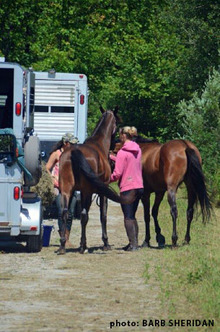Spring and summer horse shows and competitions mean that many horses are traveling to competition sites nationally and internationally. Horse owners need to be proactive and take steps to ensure that horses are protected from stress that can undermine their health.

Relieving horse stress while traveling
While some horses adapt well to being transported, others do not, and being moved from one place to another can be highly stressful for them, whether they travel by air or by road.
© 2015 by Barbara Sheridan
For horses that breed, show or compete in athletic events, transport may be a necessary and frequent part of life. Air transport of horses is obviously necessary for horses traveling to international competitions, and it is also viable for those going long distances within the United States.
A 6-hour flight from New York to California can be a lot less stressful than a 72-hour/five day van ride. While some horses adapt well to being transported, others do not, and being moved from one place to another can be highly stressful for them, whether they travel by air or by road.
Dr. Desmond Leadon of the Irish Equine Centre in County Kildare, Ireland, is a leading authority on transport stress in horses. He has written extensively on the subject and includes a definition of stress in the context of transport: Stress occurs when a horse is required to make abnormal or extreme adjustments in its behavior or internal management
Horses have a great amount of variability in their response to the stress of travel. Some seasoned traveler sport horses that donât blink an eye when loaded and there are young horses who fail to eat or drink along the way. Outcomes for these horses are often different despite similar travel conditions.
While some adaptations to travel are normal, a measure of these adaptive responses can provide a better understanding of how stressful the circumstances are to the horse as well as its probable rate and duration of recovery.
According to Dr. Leadon of the Irish Equine Centre, âWe have studied airflow, temperature gradients, and environmental contamination within road transport vehicles and in aircraft carrying horses. It makes surprisingly little difference whether the vehicle has wings or wheels.â
Rather, he proposes that managing the transit environment and a horseâs general health are key elements to delivering a horse to its destination in as good a condition as possible.
Factors involved in transport that contribute to stress include physical factors, psychological factors and environmental factors:- Loading and unloading
- Separation from the herd and familiar environment
- Fluctuations of temperature and humidity
- Constant vibration and noise
- Exposure to strange environments and animals
- Altered and possibly inadequate ventilation
- Noise
- Confinement
- Exposure to gases and particles from exhaust, urine and feces
- Loss of balance from accelerations and decelerations
Lack of exercise or movement (particularly for older horses) - Road or flight conditions
- Deprivation of feed and water
- Schedule changes
- Intensity and/or fluctuations in light levels
- Orientation to direction of travel
- Dust
- Head posture
- Bedding
- Decreased function of the immune system
- Footing materials, traction
- Lack of exercise or movement (particularly for older horses)
- Exposure to disease or pathogens
- Socialization with other traveling mates or isolation if traveling alone
- Length of journey
Horses stressed by transport are more susceptible to a variety of diseases, including pneumonia, colic, diarrhea and laminitis. Additionally, transport stress may alter energy metabolism, which can affect the horseâs ability to perform or compete soon after transport.
For these reasons, it is important for the horseâs welfare to minimize the stress of transport in every way possible by optimizing the transport environment. Horse owners need to take control of what can be controlled in order to reduce the chance of illness or injury in your horses and ensure their health whether traveling short distances or around the globe.
